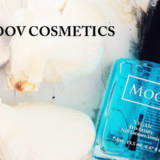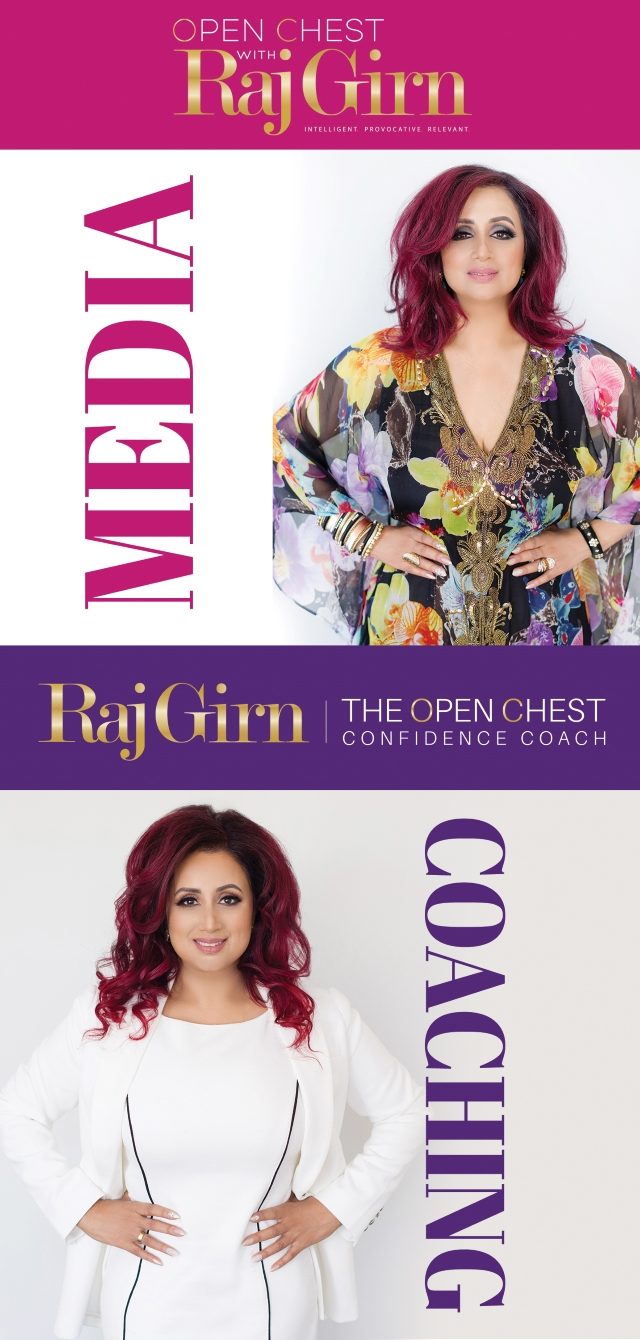I chat with my long-time girlfriend, multi-award-winning actress & producer Pooja Kumar about her new ZEE5 Premium film (where she is the title lead), for the four film anthology called Forbidden Love (now streaming), which explores the darker side of love.
WATCH THE FULL INTERVIEW BELOW . . .
Welcome to another episode of Open Chest with Raj Girn Live. Today’s show is called Navigating the International World of Cinema as A Woman. I couldn’t think of a wiser, knowledgeable and experienced actress than my girl, Pooja Kumar, who is on screen with us right now. She is an award-winning American actress. I want to kind of give you a little bit of information about who she is for those of you who may not be fully familiar with her. She was Miss India USA, and that’s kind of where she got her start a number of years ago.
Since then, she has done over 35 movies across Hollywood, Bollywood, Kollywood and Tollywood. She has also done 15 off Broadway plays, 25 TV shows, numerous TV commercials, and has also hosted some of the biggest events across the world as well. She is also a producer of 3 award winning short films. Being an American who is very popular in South Asia has given her the ability to bridge gaps between America and South Asian perspectives throughout her career.
Also, her connection with her fan base has given her insights on what resonates with Americans as well as with South Asian audiences. She deeply cares about the role diversity and inclusion needs to play both on and off screen. We will be talking about this today. Welcome, my dear darling Pooja Kumar.
Thank you, Raj, for that lovely, lovely introduction. It’s so good to see you.
It’s such a pleasure to see your gorgeous sunshine smile. I’ve missed you like crazy girlfriend.
Aww, I miss you, too. God, it’s been forever.
It really has. So, you know what we’re going to do? I’m going to ask you to share with everybody how you and I met. I knew when you had become Miss USA. So let’s share that a little bit with our people out there.
No, I want you to talk and then I’m going to chime in. I’ll let you because I love the way you describe it.
WHY SHE DECIDED TO ENTER A PAGEANT AND THE PUBLIC REALM. . .
Oh, my God. Okay, so it was really interesting because rarely would you see women from our culture be promoted in the realms of beauty and brains and bringing all that together in the North American market. It was very rarely seen, and Pooja was one of the first that was really put on that kind of platform and that kind of piqued my interest about who is this woman?
And the thing is about Pooja is that not only is she stunningly beautiful and has like the craziest and the funniest personality, which is also very deeply emotional and intelligent woman, like everything she does, always has a rhyme, a reason and a purpose. Whatever she does, she wants to bring people along with her. That’s the thing that I find with Pooja. Pooja, like your start was so incredible.
Tell people a little bit about why you decided that you wanted to enter a pageant like this. What was it that attracted you to kind of go into the public realm like that? Because you came from a very traditional background.
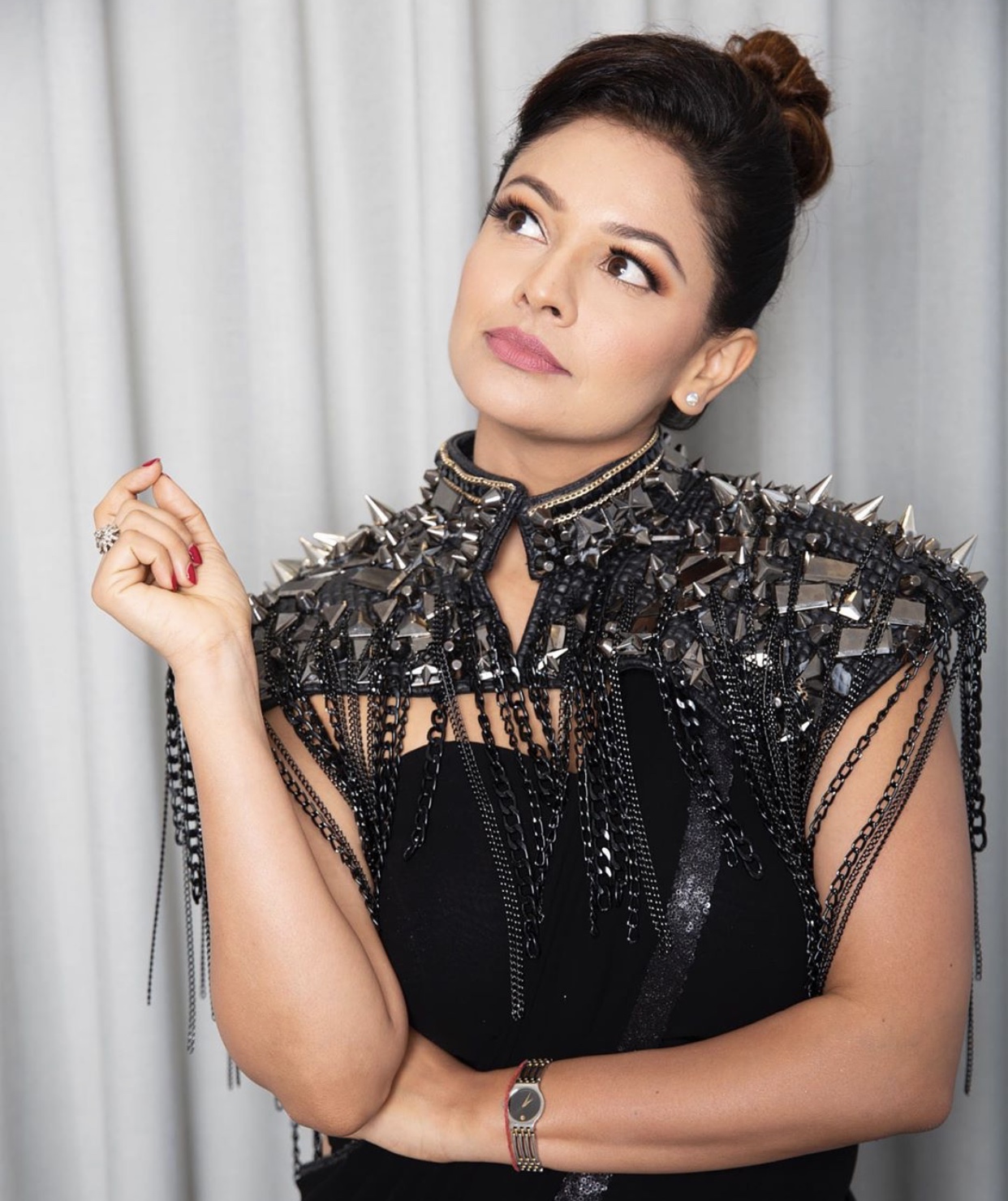
Yeah. I mean, look, I’m a girl from a small town, you know, St. Louis, Missouri. I was born and brought up. My dad immigrated in 1970. I have always had the arts in me. That’s because of my mother. She introduced Indian cinema. She introduced the Indian art.
She introduced our culture in such a fun and interesting way. It wasn’t like forced upon, like my brother and myself. It was more like you should celebrate that you’ve got two great cultures. You’ve got the Indian culture and you’ve got the American culture. So now you have to sort of simulate into both of them, you know?
I really appreciated that, because it was her attitude that made me fall in love with who we are and where we came from and embracing the good parts. Of course, every culture has, you know, their bad parts. I started dancing when I was three. I learned bharatnatyam, kuchipudi and kathak.
And that’s because my mom introduced me to all of them and she dedicated her whole life to my brother and I to making sure that we have a certain value system, that we sort of enhance our Indian culture and also spread that culture in a really great way. Indian society has been around for decades.
I mean, we’re talking about centuries. There must be something to it, right? There must be some whether it’s spirituality or whether it’s the food or whether it’s the turmeric that we eat all the food items that we have. There’s something that’s been so long lasting about our culture and we should celebrate that.
I’m so happy that she did that because of that, I’ve always been a performer. And so, I always did plays and musicals while growing up. But I was in St. Louis, Missouri, where it’s predominantly white American. But I didn’t feel that I was brown, or I didn’t feel that I was anything different from anyone else because my parents gave me that confidence. They’re like, ‘you’re not any less and you’re not any different.’ So, because of that, I did plays in musicals. But of course, in Indian families, you’re not really supposed to go into entertainment as a field. You just kind of do it on the side.
In fifth grade, I did a play called Taming of the Shrew and I auditioned for the female main lead. And my teacher said, ‘oh, you’re really good. You should do the female lead.’ And I said, ‘well, why can’t I do the guy’s character, Petruchio? He has a bigger character.’ And in the olden days, the guys were playing the women characters, so why not be a little forward thinking? And I was like, ‘that’s the bigger character, more interesting. So, I’m going to play that.’ She’s like, ‘okay.’ So, my first project that I ever did was I played Petruchio in Taming of the Shrew, so I played the guy’s character. Ever since then I said, I’m going to be a performer, I’m going to be an artist no matter what.
Then, I performed dances in Chicago and then after then as soon as I finished high school, I was Miss India Tribune in Chicago. That was a pageant that happened sort of in the Midwest. I entered that pageant because they’d asked me to come and perform a dance. And they said, ‘look, we don’t have enough contestants, so we need a minimum of 15.’ They were like 14 or something like that. And so, they said, ‘would you like to participate in the pageant?’ I said, look, ‘I’ve never done pageants. I don’t know how to do them.’ But then I thought, well, why not welcome this challenge? And it’ll be fun. I’ll meet some new girls from the Midwest, I’ll make some new friends and meet new people, and it’ll be a great experience. So, I won that. Then from there I entered the Miss India USA and then I won that as well.
Since we can’t do miss India in India because we weren’t born there, this platform was created by the India Festival Committee. They all looked like us but then we were still in America. So, it was sort of that transition of being an American, but then also having this sort of Indianness to us, which was really great because I saw all these other women kind of thinking along the same lines. And that was great to just have around and a good support system. So, when that happened, things just sort of accumulated and catapulted into many other adventures that I had. Then I had a chance to go to India and be part of ABCL, which was done with Amitabh Bachchan Corporation Limited.
Absolutely. Talk a little bit about that. It almost sounds like a movie that a girl from a small town all of a sudden gets catapulted into the limelight and gets the top-notch beauty title in North America for South Asians. And all of a sudden, she is over in Bollywood, working with Amitabh Bachchan of all people. How do you get your head around this, the mind-shift that’s needed to be able to take all that in?
Maybe because I’ve been performing for so long already as a kid, right? So, that performance and that artist in me was always in there. That fire, that passion, which I always tell everyone is you have to have that no matter what happens in your life. I also went to India every year during summer, like my mom would take my brother and I and we would spend like two or three months there. And that’s where I would learn dance.
I was already familiar with India. But the mentality and the emotional side of it was very different, you know, being in India and working in India. So, and then when ABCL happened, they were launching 10 guys and 10 girls, and they were having this huge contest. While I was a guest at the Miss Femina show in India, I was staying at the Holiday Inn in Mumbai. I’m at the beauty parlor getting my hair done and sitting right next to me is Mrs. Bachchan and I said, ‘oh my gosh, I’m a big fan and I’m here doing this.’ And she said, ‘oh, well, we’re having a contest. Why don’t you enter?’
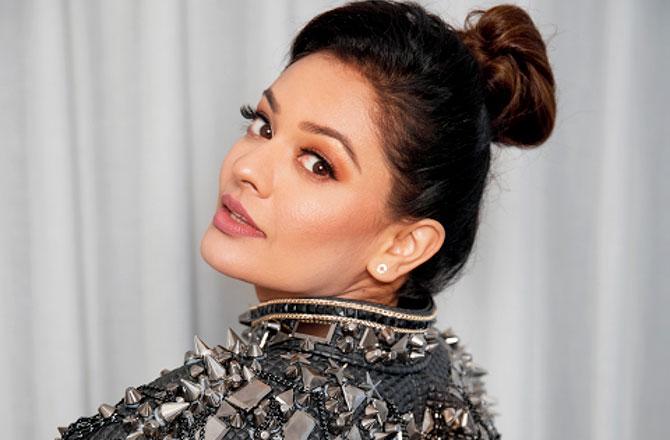
I said, ‘well, look I’m not even from here. I don’t even live here. I would love to participate.’ She goes, ‘well, send in an application and be part of it.’ So, I send my application and there was 50 of us. I got selected in the 50 and then from 50 there was 25. And then I got selected in the top 10. So, they trained 10 guys and 10 girls in Hindi.
They trained us in dancing and in diction of Hindi and then also acting. So, I learned from Roshan Taneja which was he was like the best teacher from the Film Institute. So, I told my mom and dad that, ‘look, I’m going to take six months off from college.’
How did that go down?
Well, it was very interesting, my mom was all for it, but my dad was like, ‘wait, you’re going to what? You’re going to take a break from school? Education? That is unheard of in our family. So, because I’m the first one is actually gone into the entertainment field, everyone in my family, they’re all engineers and they’re doctors. That was a very interesting conversation. But I kind of maneuvered my way and I told him, I said, ‘look, I’m going to just take six months and I’m going to go back. So just let me take advantage of this opportunity, because this only comes once in a lifetime.’
I also thought, like, you know, between the ages of like 15, 16, 17, 18, 19, you get educated at that time in such a great way that that foundation gives you the skills that are going to be long lasting right now. Then I did that and then I was there for six months. I trained. Then I got an opportunity to host the Miss World pageant and I hosted the pre-show. That was where I met my director Priyadarshan who I just did a project with. I met him there and they asked me to host the pre-show, which is a live program. There was no teleprompter.
How did you feel about that? Oh, my God. Was it in English?
It was English. Thank God. But it was live all over the world and I had to do all of the dances of India. And remember, I was 17 years old. I was like, what am I doing? How am I here? But I was very good at memorizing. So that’s a really good skill. It’s very helpful in the arts. So, I hosted that. Then I got an opportunity to start veejaying for Channel V. I did that. Then I did another Tamil film, which was my first Tamil film, and I started out there.
Can I ask you something about that? So, Tamil is not your first language.
No.
HOW HER EXPERIENCE WAS AUTHENTICATING HERSELF AS A TAMIL SPEAKING ACTRESS. . .
Can we talk a little bit about and this is the thing that I feel that everyone out there who are aspiring to go into the entertainment field because all they think about is fame and money, they don’t actually understand the amount of work that goes into what you do. I mean, you’ve just finished saying that you’ve literally been training since you were three in various capacities.
So, let’s talk a little bit about this, because it’s kind of a very rare thing for someone that is American to go over to the subcontinent and then all of a sudden be in a massive film and speak a language that you did not know. So, I just feel that people need to understand and actually hear how much work actually goes into preparing yourself for something like that. Can you talk to us a little bit about what that experience was like, authenticating yourself as a Tamil speaking actress?
Yeah, you know, after I did this training in India and then I came back to the US and I went to the American Academy of Dramatic Arts because I knew I had to increase my skill set and just keep getting better, which I do even to this day. Whether I’m practicing a monologue or whether I’m looking at scenes or reading screenplays or I’m watching different scenes that female actresses have done.
I’ve always been watching, like Madhubala and Vyjayanthimala are two of the famous actresses that are out there. But I’ve always been watching their work because at such a young age, they were able to do a whole gamut of emotions. You know, they were like 15, 16 years old, and they were able to portray these characters that require a lot of life experience, you know, and require that emotional maturity to showcase those emotions. So, I took a call early on that I said, ‘look, the talent and your skills are going to be long lasting.’ Because your looks and your physicality are going to fade no matter what, right? That’s just a fact of life.
Well, it hasn’t happened yet, darling, but carry on.
Thank you. Thank you.

[both laugh]
I think it’s because I’m very passionate about what I do, and I get to do what I love. And I think that once you find your purpose, it’s even better. Because then you’ve got clarity about what you’re doing and how you’re going to do it.
That’s something that I found in you too, Raj. You’ve been a pioneer for women and for especially for South Asian women and doing things your way and being the entrepreneur and the owner of a business. There’s a lot of us who look up to you, you know, you’ve been one of those women.
Thank you. That means so much coming from you.
We didn’t have that many women while growing up as sort of women we could look up to. I remember the only Indian woman that was on TV in America was Persis Khambatta and she was the bald woman on Star Trek who everyone thought she was an alien.
So, they thought Indians were aliens anyway. They’re like, ‘oh, you’re brown, oh my gosh where are you from?’ Like we’re from some other planet. But she paved that way for us. And you’re one of those people to pave the way of being an entrepreneur and a business owner and being successful.
So, going back to what we’re saying. The training I’ve always been very adamant about it. I keep on training; I keep on working. And so, when I went to Chennai. I think all that training helped me into adapting to the culture and really bringing it on immediately. Because when I had to do a Tamil film, I had to memorize everything. I had to memorize in Tamil and then memorize the other person’s lines so I could kind of chime in. And then you have to react.
Tamil is a very difficult language. It is not easy. You’re talking about 365 letters in the alphabet. Yeah. It’s a Dravidian based language, right. It’s not Sanskrit based. So, Sanskrit based is easy for people who know Hindi, but this is Dravidian. So, it’s one of the first languages actually in the world. So, I’ve been trying to learn it and I keep on trying to sort of improve on it. It’s really hard to learn. And that’s what I say, after a certain age, there’s only so much you can learn as far as languages.
I mean, clearly you did an awesome job sweetheart because look at the big budget films you’ve done in that industry with kind of the king of that industry, no less. Let’s talk a little bit about that since we’re in this industry. Talk to us a little bit about those movies, because there’s been a stream of people just talking about you from that perspective. Let’s go there, because a lot of people know you predominantly from that on the Indian subcontinent.
Yeah. So, when I worked over there, I got the opportunity to work with Kamal Haasan. I mean, it’s been amazing. He is someone who is a pioneer. He’s someone who perseveres, and he always tries to reinvent himself. He’s someone that so many people look up to because he’s been giving so much to Indian cinema to Malayalam, to Hindi, to Tamil. I mean, he’s given like so many movies to all the different languages.
That was something I appreciated so much about him and that he continues to do that. He can sit back and relax. He doesn’t have to prove anything. He doesn’t have to do anything anymore. But because he loves his people and he loves what he does, which is something that I think he probably saw in me too, right?
And so that’s how he saw how I appreciate it so much and I work hard, and I’m dedicated to whatever character I play and try to do the best that I can. So, he wrote a fantastic character for me and I interpreted the way that I thought. And then he would direct me into doing it because he’s got the whole vision right? He had obviously the whole vision in his mind about what this character was.
I just tried to bring in those emotions, but it was hard because I didn’t know what anyone was saying, but I just memorized sort of the emotions to it. I think he sort of appreciated that. He was like, ‘wow, you can’t speak the language, but you get the character right away.’ So, you know, you don’t have to know the language because language is just a tool to communicate.
But if you understand the emotions, then people are going to connect with you, which is what I was hoping would happen. And it did happen. Because then he hired me again and then again because people appreciated the work and then it was a good connection because then people started liking what we were doing on screen.
WHY SHE DECIDED TO BE AN INTERNATIONAL ACTRESS. . .
And there was a lot of chemistry that people and media would talk about the fact that there was this incredible chemistry that took place between you guys. And I feel that also is something that you can’t really bank on, you can’t know is going to happen. I know you and I know that when you make a commitment to do something that whatever it takes, you’re going to make it work.
You’re a hard-working actress, and I know that very well about you. That goes to play with the fact that you have worked in so many industries around the world that, you know, we can’t call you just a Bollywood or Hollywood or Kollywood actress. You are an international actress, right? So, let’s talk a little bit about that. Walk us through this kind of whole idea of working in all these industries. Like why?
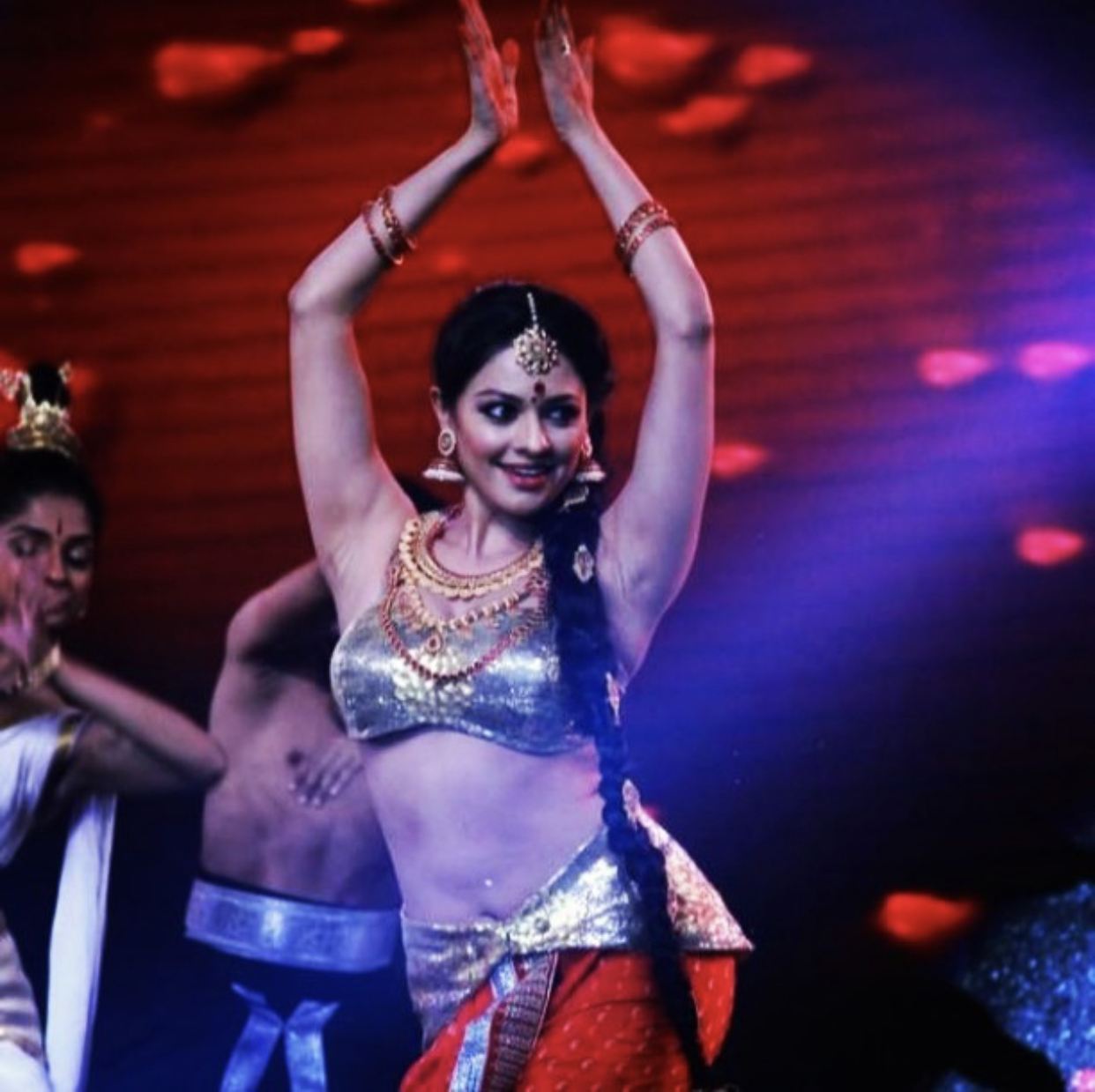
So, look, I mean, I’m Indian, my look is Indian, and so obviously with Indian movies and Indian cinema, I’m going to resonate, right? We’re going to resonate. There’s no question, because in American cinema, the stories are about American society and American norms and American societal norms.
Only in the last 20 years or even 10 years have people embraced immigration in America and have embraced people of different ethnicities and different skin colours. And that we don’t need to look at that in order to be convinced of your character. I think that’s only happened recently. I’ve been pushing for that my whole life. I’ve been pushing for that and trying to write characters, trying to be part of projects that are internationally acclaimed.
When I did this one IFC series called Bollywood Hero with Chris Kattan. You know, we went to India, we shot it in India. We did three episodes and it was a romantic comedy and it was great to work opposite him because he’s so fantastic and so hilarious and again, because he worked so hard, we also had like chemistry, which is great because I always am passionate about the people who work really hard and love what they do.
How can you not love them? Because a film requires so much effort and so much teamwork and it goes just beyond yourself. So, there’s so many aspects to it which you can make so interesting. With Bollywood Hero, we went to India, then I did a couple of American films. Man on a Ledge with Ed Harris and Brawl in Cell Block 99 with Vince Vaughn. So, I’ve always been one who love the projects that I work on, whether it’s in India, I mean and even anywhere in India or in Pakistan or anywhere. I’ve done a couple of Pakistani TV serials. Which we shot in Mauritius and then we shot a couple in New York.
So, for me, I’ve been lucky, Raj, that people have appreciated the work that I’ve done. I’ve been cast based on all my work. It wasn’t because I knew the director, or I knew anyone. It was all based on people just appreciating the work. Then these directors wanted to work with me. Which I am so appreciative of, because at the end of the day, it’s a very tough business.
But again, I always reiterate, I always keep saying it. Now, you got to work on your skills, and you keep on persevering and you kind of do interesting things and people then get intrigued. You do different things. And I didn’t want to do the same thing. I also thought, ‘well, look, I’m already from America. It’s already a different path and I can’t do the same path as everyone else because I’m not everyone else.’ So, I just thought I’ve got to pave my own way and be happy at the same time in doing that.
Let me ask you something. I don’t think there’s an actress out there who’s born and bred in America that has worked in this many different industries the way you have and been so successful at it. Your reputation precedes yourself in terms of the people that then decide they want to work with you. So, with that said there’s a lot of kind of industry culture that is different in each of these industries. Can you walk us through kind of the mindset with which you have made it work for you with all of these different ways of working and acting and being in film in different industries?
Yeah. In America I’m very comfortable because this is sort of my home territory. So, that’s not too much of an issue here. But I’ve always been trying to stop these sorts of stereotypical things that they think about Indian women. A lot of the casting people think, ‘okay, well can you do the accent?’ And I said, ‘well, yeah, of course I can do the accent.’ But then I tell them that there’s all kinds of different accents.
The people in Kerala speak a little different. The people in Mumbai speak a little different. So, it’s like there’s different accents from all over India. The other thing was that they have this sort of idea that we’re just I.T. people who just sit in front of the computer. The thing is, is that we are. So, there’s no question about that.
But the thing is, is that I think what’s great about coming from India and Pakistan and all the South Asian countries is that we’ve got like I think we have the beauty and the brains and so that we’ve got those two things going for us. I think I’ve tried to break that barrier in the last 10 years because they have this idea about Indian women like, ‘oh, they’re not so good looking. And they all they wear are sari’s and then they’ve got these thick eyebrows and they’re hairy.’ I mean, yeah. So, we are? But we can take care of that also, you know. [laughs]
Exactly. Oh my gosh. So, you’ve had to deal with those kinds of stereotypes?
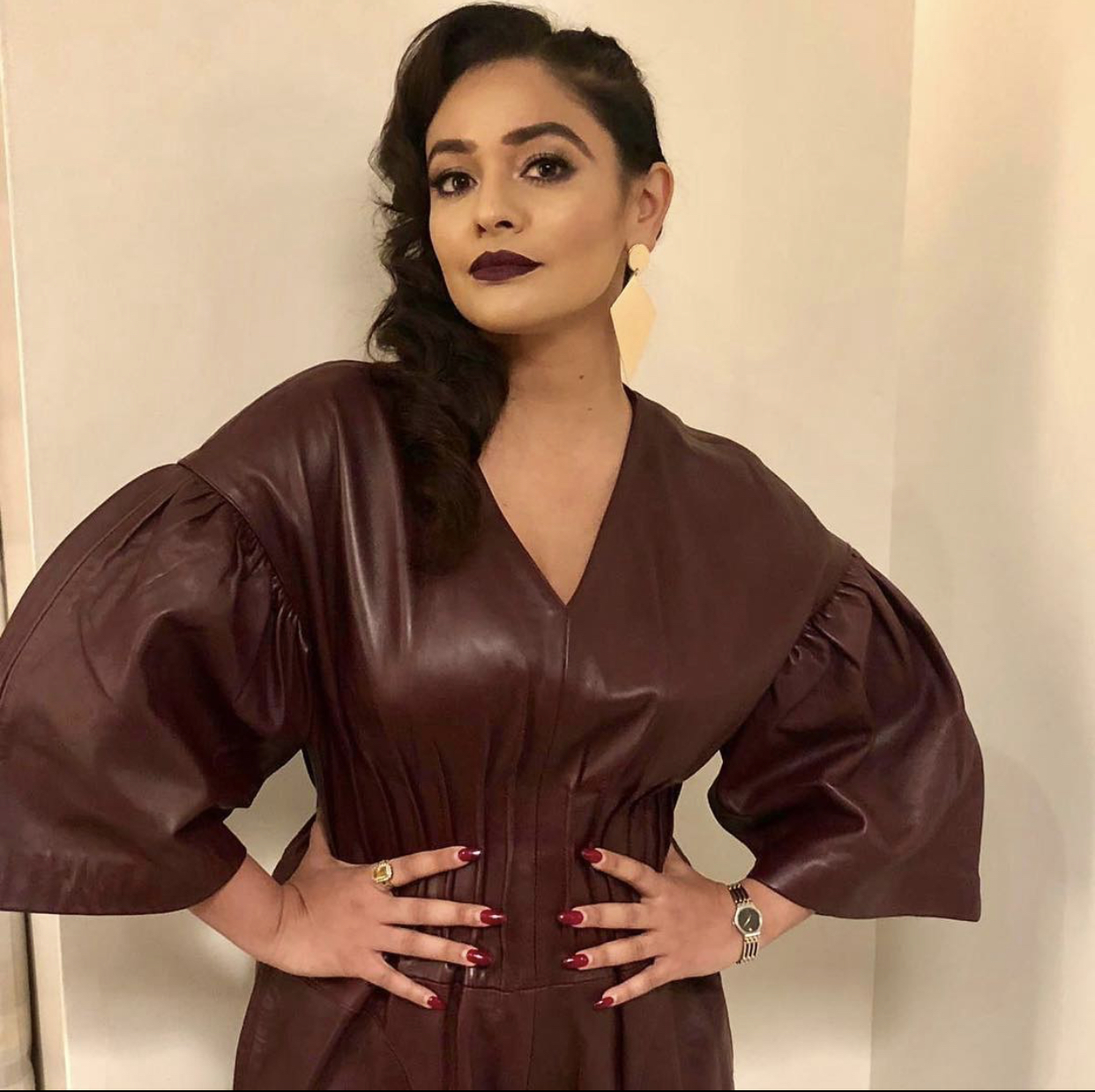
So that’s what we’ve had to do in America, right? So, you have to break down those barriers, which takes time. I think now people have embraced it. And now I think Brown is like, really cool. It’s cool to be brown now, you know? It wasn’t before. That was more in America.
Then now working in India, you know, there’s different industries. Even in Mumbai, it’s a little different, in South India is very different. They have different industries there. I’ve done a Telugu film. Yeah, Hyderabad. My main thing is that you just adapt.
Adaptation is key as an actor, because you’re meeting a new family every time we do a project. How do you assimilate into that family? Then once you become that family, then obviously the whole team comes together, and you make a great project.
You can’t come into India thinking that you know everything and you’re better than everyone else. You can’t say that because in India they’ve been able to do projects in very difficult conditions without having any access to knowledge or any access to anything.
In America, we’re just so lucky because we have access to schools, and we have access to teachers, and we have access to so much information. But in India, they don’t. They’ve been able to learn everything on their own. I’m so appreciative about people when they work in India because of the conditions. I always felt like, well, when I go and work in a Telugu film like I’m going to be so respectful to their culture and to their cinema and to how they do their characters and how they shoot their movies.
The differences that I see is that the stories are just different, but the emotions are the same love, anger, hatred, possessiveness, jealousy. These are all the same, whether it’s in America or Italian cinema or Indian cinema. It’s all the same. It just has to do with the society and the values that each of these places have, which are different.
That’s interesting that you say that Pooja, because I think that what I’m hearing you say is that you’ve kept your senses alert and open to understand what you’re walking into. Although you’re not losing who you are, you’re finding a way to become not foreign in the place you work in, right? I kind of feel that is a big key fundamental factor as to why you’re able to so quickly and seems like effortlessly just kind of fit right in.
I feel that knowing you personally, you’re not judgmental, you’re very welcoming with every different type of person that you meet. I think that these natural characteristics in your personality have served you well around the world, and the reason why you fully can say that you’re an international actress. I am confident that we can put you anywhere in any industry like China, Russia, wherever, and you’ll figure it out.
I think a lot of it is I’m just curious about other people and other cultures. I find it fascinating to learn about them. I also think as an actor you’ve got to learn about other people and learn about other things. If you’re curious, you’re going to be able to show different range of emotions. Because if you just stick to who you are and you just stick to that, how are you going to be able to identify with women all over the world? How are you going to change their lives if you’re doing the same thing? It’s like moving with the times also.
I always say, like if I want to shoot a film on 35-millimeter stock right now, well, you can’t because everything is digital, right? I can stick to my guns and say, ‘oh, no, I’m only going to shoot on 35-millimeter. I don’t have a choice. I’m not going to do it.’ Well, then you’ll be stuck in your own home by yourself because no one’s going to see that. So, you have to also move with what’s happening and adapt. Then also, how do you sort of consume that naturally and authentically and truthfully.
And, how do you?
There’s no set formula. Again, you know, I love people and I love what I do. And I love showcasing different emotions because I want, like women and young girls to come up and be strong and be confident and go out there and persevere and become warriors.
WHY SHE DECIDED TO TAKE THE ROLE IN HER NEWEST FILM ANAMIKA. . .
Absolutely. You’ve done that in so many different ways, in so many different types of roles. I’ve got to talk to you about the film that was released yesterday on ZEE5 Premium. It is one analogy of four films, Forbidden Love. You are in the film called Anamika.
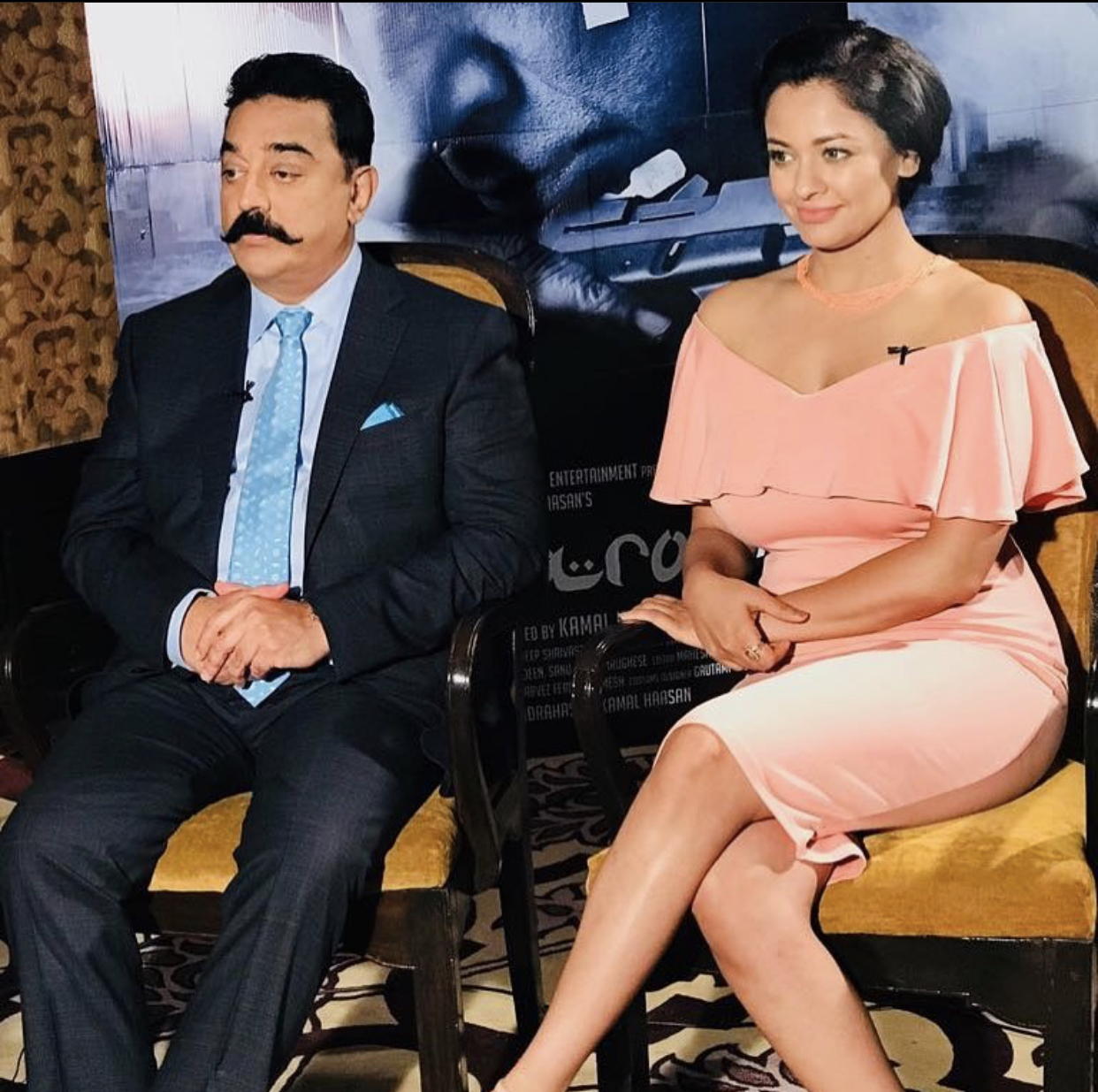
You play the title lead in it and people are going bonkers on this film in the most positive way. I mean, media is talking about it. Everything from Hindustani Times down.
While we’ve been chatting here on Instagram live, people are going berserk talking about your role in Anamika. I have to go there right now. Tell us a little bit about why, first of all, did you decide that you wanted to take this role? Because without giving away too much it’s quite the twist. It’s not what you think is going to happen. Tell us a little bit about that. I mean, I assume that it’s the role.
I mean, yes. Yes, you’re right. You’re right. The first job I got was with Priyadarshan, who is the director. I’ve been for 20 years trying to tell him, let’s work together, let’s work together. When are we going to work? You know, I was like I’m a good actor, please hire me. He was like, I know you’re a good actor. I will. I’m waiting for the right project to do. 20 years later, he calls me up and says I’m doing this project. And I said, yes. I didn’t even ask what character, screenplay, what language? Because he primarily does his movies in the Malayalam industry.
But I appreciate his work because he’s done Hindi cinema and he’s done Tamil film. He’s done quite a lot of work and he does serious drama. He does romantic comedies. And he’s one director who’s been able to do all kinds of stories and portray them in an authentic way. And the plus point is that he’s got such interesting female characters that he writes.
If you see earlier movies like Kaalapani, there’s another film called Virasat and then he’s done Hungama. So, there’s like these three different kinds of genres and all of them have great female characters. When he narrated this to me, I had already said yes. But I mean the story is so well-written and you’re sort of surprised at the end. For me it was challenging because I’m playing this Indian woman who’s a housewife. So, for me, being in America, I know the sort of nuances of American women. But with Indian women, it’s a little different. And this is in Hindi. I haven’t done in Hindi for a really long time.
So, I was brushing up on my Hindi along with trying to figure out like sort of the nuances and physicalities of Indian housewives. I’ve been observing a few of them. I talked to my maasi to kind of get some ideas. But in watching them, I was like watching how they handle their kitchen, you know, what are the things that when they walk into the kitchen, what is the first thing that they do? Because the Indian kitchen setup is different from American kitchen setup. These small little things add up to making the character as authentic as possible.
The whole series is called Forbidden Love and I wanted people to feel emotionally connected to her. Why she made the decision that she did. People are quick to judge. You know, they quickly think that, oh, well, you did something wrong. So, there’s a reason why you did something wrong. And especially with women in general, we’re scrutinized on our looks. We’re scrutinized on our skin colour, our hair, our bodies all the time. I wanted people to come from an empathetic place for her and do it as naturally, obviously, as possible. I studied a few movies where women were playing housewives. I hope people would appreciate it, which I think a few have.
A lot of people have a sweetheart. Is there any kind of insider scoop you can give us regarding filming it and perhaps how you were able to be so authentic? Because I’ve seen outtakes of it and I’m dying to see the whole thing. If I didn’t know you personally, I would have thought that you were actually an Indian actress from India. The nuances were really, really authentic, sweetheart. Talk to us a little bit about maybe some insider stuff that was happening behind the scenes that helped you bring this character to life, other than obviously the work that you did.
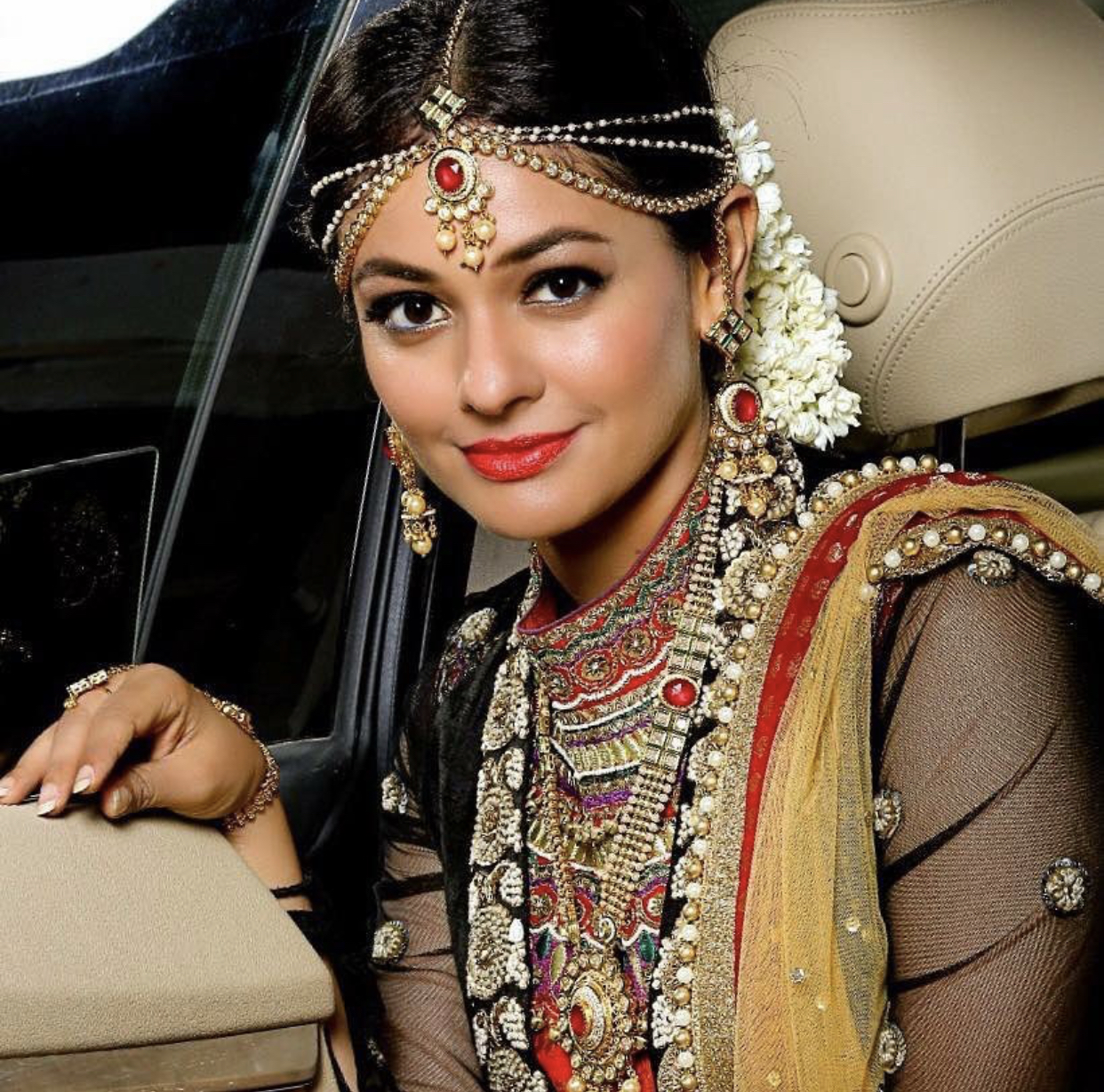
Right. I mean, look, Priyadarshan is such a fantastic director. I mean, he knows how to extract performances out of people, there’s no question. But in this case, I did a little bit of homework. You know, I created a little bit of backstory about her. Where was she born? Where was she brought up? Does she have a mom? Does she have a dad? Does she have a brother or sister? A few things that I brought up so that I could make her character realistic to me.
It’s not just this foreign person who I need to embody, but it became part of who I was, and it came through me. So many people said, ‘oh, you’re playing a character’, and the character is like somewhere foreign. And I said, ‘no, but every character that you do is coming through you.’ So, you can’t separate yourself of who you are from the character.
You don’t play a role like you are this person. That’s what I find with so much of the body of work that I’ve seen you in, you know, when to be larger than life, when to know that you are a piece of a jigsaw puzzle that needs to fit right in your spot and everything in between.
I think the more realistic and more humane you are, the more you’re going to be able to connect. I’m wanting to do different projects now so I can influence women, I can influence men in creating dialogues in their relationships. I think it’s a very tough time for people to relate and people to be sort of dedicated to the people in their life because our wants and needs have increased.
We’re not our parents’ generation anymore where the women will quietly suffer. Which they have been, and I don’t think they should anymore. Women have been constantly ignored, especially in Indian society. The women are doing so much work. I mean, they’re handling the housework, they’re handling the kids, they’re handling their in-laws. They’re taking care of so many things.
At the end of the day, women just want to feel loved and they want to feel secure and appreciated and respected. They just want to feel secure and not secure financially, but secure with their man so that they know that he’s going to be my partner with me through the bad times and the good times. I think that now with women going out into the workplace, especially in India in the last 10 years because of call centers, women are getting exposed to the rest of the world and they’re realizing, well, we don’t have to suffer anymore.
I hope this film creates dialogues between your husband or your partner or your boyfriend or whoever it is that like, look, I want us to keep connected. I want us to keep hitting those emotional highs with each other because it’s easy to lose those things. You know, after being 8 years in a relationship or 9 years or 10 years in a relationship, you sort of start taking advantage of each other. I think especially because of this pandemic. You take each other for granted and I think this pandemic has taught us a lot like what do we really need? We need Internet.
[both laugh]
We need food and we need love. That’s what’s going to get us through all of this. I wanted people to sort of empathize with her and not judge her character and understand why she makes the choices she does. And then in the end, you’re sort of pleasantly surprised. You’re like, whoa. You have to watch it and see.
Oh, my God. I cannot wait to see it. But all the early reports so far, media critics, they are raving about Anamika. It’s available right now to stream. It’s streaming on the ZEE5 Premium platform. Is it streaming anywhere else?
It’s just on that platform for right now!
Alright, folks. You heard it right here Anamika. It was released yesterday. Our fabulous Pooja Kumar plays the title role. It is a very interesting film. If you read any of the media out there that’s talking about how powerful the role was and the fact that my girl here had to kind of really think about how important the message was with this film is just a testament to just all the work that she’s done throughout her career and the fact that truly she is an artist, an actress.
And I have to say, also a producer. Let’s talk about that, sweetheart. You’ve done three projects as a producer, and they’ve all been award-winning. Let’s talk a little bit about why you decided to don the producer hat.
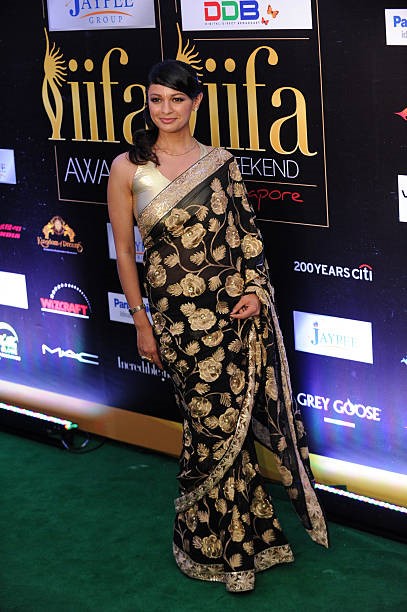
As artists, we want to create and we want to constantly showcase emotions and characters that don’t necessarily get to be seen, right? There are certain characters that I have in me that I wanted to showcase the emotions about. The latest film is called A Nice Girl, and it’s basically about a woman who is at a crossroads and she has to decide what path she’s going to take. And it has to do with race relations in America about racism. So, it’s really relevant right now.
This hasn’t released yet, but it’s going to be released later this year. I was going to release it earlier, but then the pandemic happened and then so many people are just suffering right now. So that’s probably not the right time to release it. So, I’m going to release it very soon.
Any information you can give to us regarding where people might be able to see it, or is that all in the works right now?
Yeah, it’s all in the works right now. So, I’ll update you. We’ll talk about that next time. The first one I did was called 1001 Auditions. That we got a lot of praise for. The second one, it was called Shoot My Life. We also got into quite a number of film festivals at that time.
I want to continue to produce. I’m going to definitely produce more. I’m working on a romantic comedy as a feature film. I’m super excited about that. That’s going to be the next one that we’re going to start shooting for fairly soon.
WHAT MADE HER DECIDE TO START PRODUCING AND WHY IT’S IMPORTANT TO HER. . .
Why produce? Why is that something that’s important for you?
I think there’s so many stories out there that have to be told, and just like we watch Clint Eastwood movies or we watch Martin Scorsese’s films, they have a unique voice and they have something that we want to see visually. Even Steven Spielberg or directors in India, you know, Anurag Kashyap or Guru Dutt, like all of these people.
They all have a unique perspective. We watch their movies because we’re seeing what is coming through their hearts and with their mind onto the screen. I thought, ‘well, look, my perspective on life is a little bit I would say I don’t know if people want to see it or not, but I felt very connected to these stories and the emotions.
If I feel connected to these emotions, I want to share that with people because just keeping it on my laptop in my home doesn’t serve any purpose. If I can influence or help sort of change people’s lives, then it would be great.
That was like one of the biggest reasons on why I became an artist, because I felt like I had a unique point of view and also help other people, because my parents have always brought us up thinking like, ‘look, we’re in service of people,’ which is basically what Indian culture is all about. It’s in service of doing good for other people and you have to constantly do that. And that’s what your good karma is going to bring you.
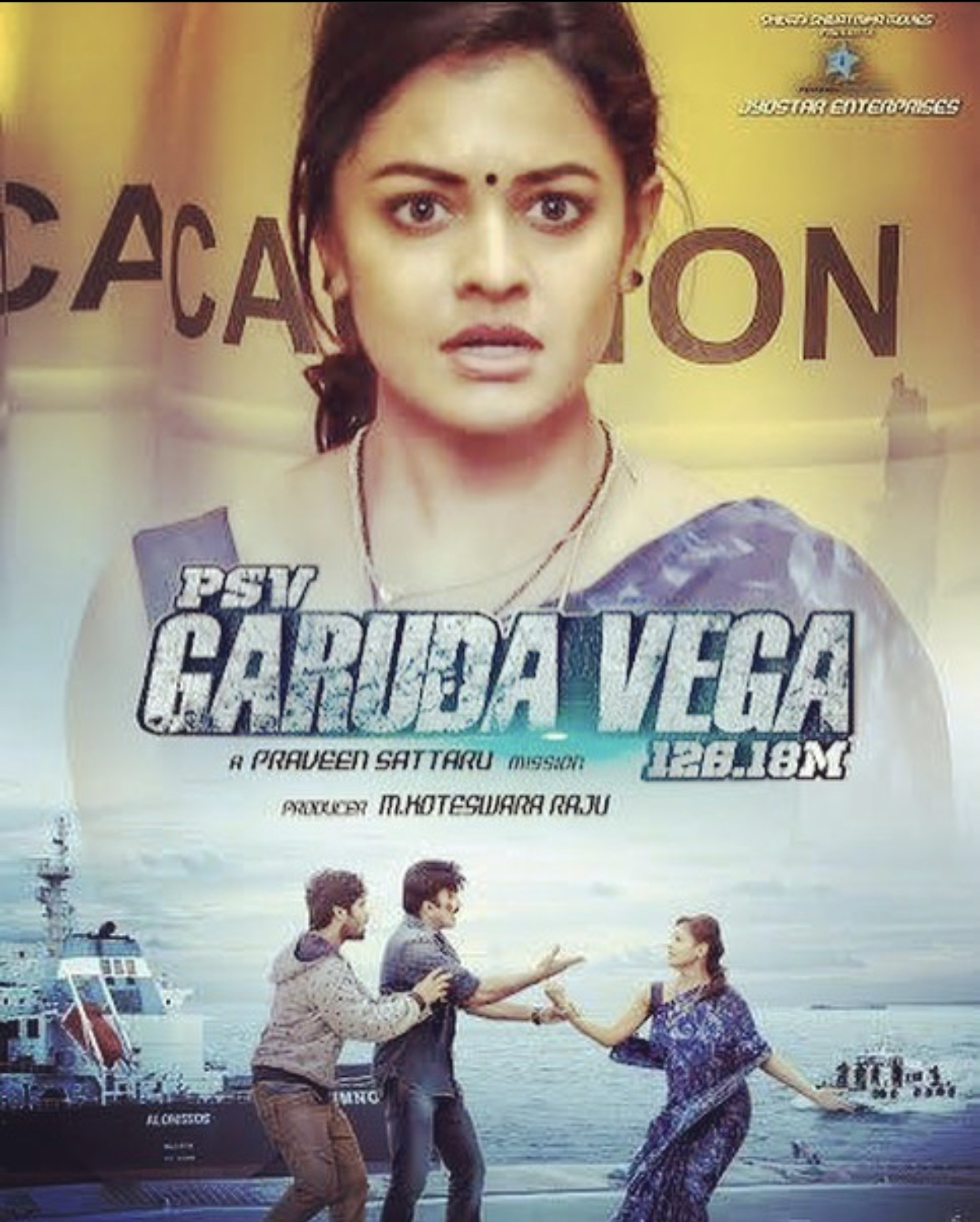
And so when you do that, and you think of artists and you think of art in that way because it’s a medium that can’t be judged. It can’t be criticized. It can’t be like an algebra equation. There’s a right and there’s a wrong answer. But in art, there’s no right or wrong. It’s perspective. That’s one of the reasons why I want to produce I think I want to tell a few stories that maybe other people haven’t thought about or haven’t had access to.
Absolutely. And it’s really interesting that you said what you just shared with us now, Pooja, just the whole idea of service, etc. and, you know, just a few weeks ago, I had a conversation with an actress who is a huge fan of yours, Melanie Chandra.
Yeah, oh I love her.
Yeah. I was saying to her to kind of share her story and she says that one of the people that really encouraged me to believe in myself and know that I could and actually helped me do so was one of your friends, Raj, Pooja Kumar.
Oh my gosh. She’s so sweet.
Well, she’s just one of many, like, you have this real mentorship, giving kind of personality about you and I know that you want to help so many more people that are looking to come into the industry. With all of the things that you’ve gone through and knowing that you’re such a giving person, to you it’s about if you can, you will. That’s just who you are, right?
Yes. Yes. Yes. Yes.
SOME ADVICE FOR PEOPLE ASPIRING TO GO INTO THESE INDUSTRIES. . .
What advice would you give to people who are looking to come into the entertainment business or the fashion business or the media business? You know, these industries that are so fluid. These are the three industries that no matter how educated you are, you can’t guarantee that you’re going to get work.
If you go to school to be a doctor, accountant, lawyer or whatever you’ve got to guarantee that you’re going to get work, right? What do you feel about these people that are aspiring a career in any of these industries? What do you feel that they need to know going in?
The first thing, it’s a very difficult industry, you know, it’s very tough and you have to have thick skin. You have to take rejection in a very positive way. And that’s very difficult to do, I think, with anyone. Because we live our lives out of fear.
Most of our decisions that we make is because we’re fearful of them. That’s why we’re taught, you know, when they keep on saying be strong and be confident and be a warrior, there’s a reason why those words are being used. It’s so that you have the confidence to tackle anything that comes your way because life is full of challenges. Life is going to be difficult. There’s no question.
There’s going to be situations that come into your life where you’re going to have to make critical decisions and it’s about how you react in those situations, which is key. So, you audition, you’re thinking you’re going to get the project, everything’s going great and then suddenly they’re like ‘sorry, it’s not happening’.
You have to be okay with that. Like you’re going to say, ‘man, this sucks. I hate this’, for like ten seconds and then that’s it. Moving on. Next. You have to be okay with that, which I think is really tough because that can play a lot of games in your head and question who you are and all of those things. And you can’t let that.
You know, I’ve gotten bad reviews before, too. So, I don’t look at those things, right? And even the good reviews, I’m like, ‘oh, great, it’s nice to be appreciated.’ But then I know it’s temporary. Today they’re saying something good. And then the next day you’re going to do something and then they’re not going to like it. The work is still the same.
Even in the projects that I got bad reviews, I still worked hard. No one ever wants to make a bad film. And no one ever goes into the project thinking like, I want to do bad acting. Even like, I don’t want to do well, like everyone wants to do well and everyone wants to put out projects that people like. The key is to not let that get to you. This whole idea of being attached in a detached way is critical. It’s like, how do you become passionate? How do you love what you do in a detached way? And that is what’s going to make you last in the industry.
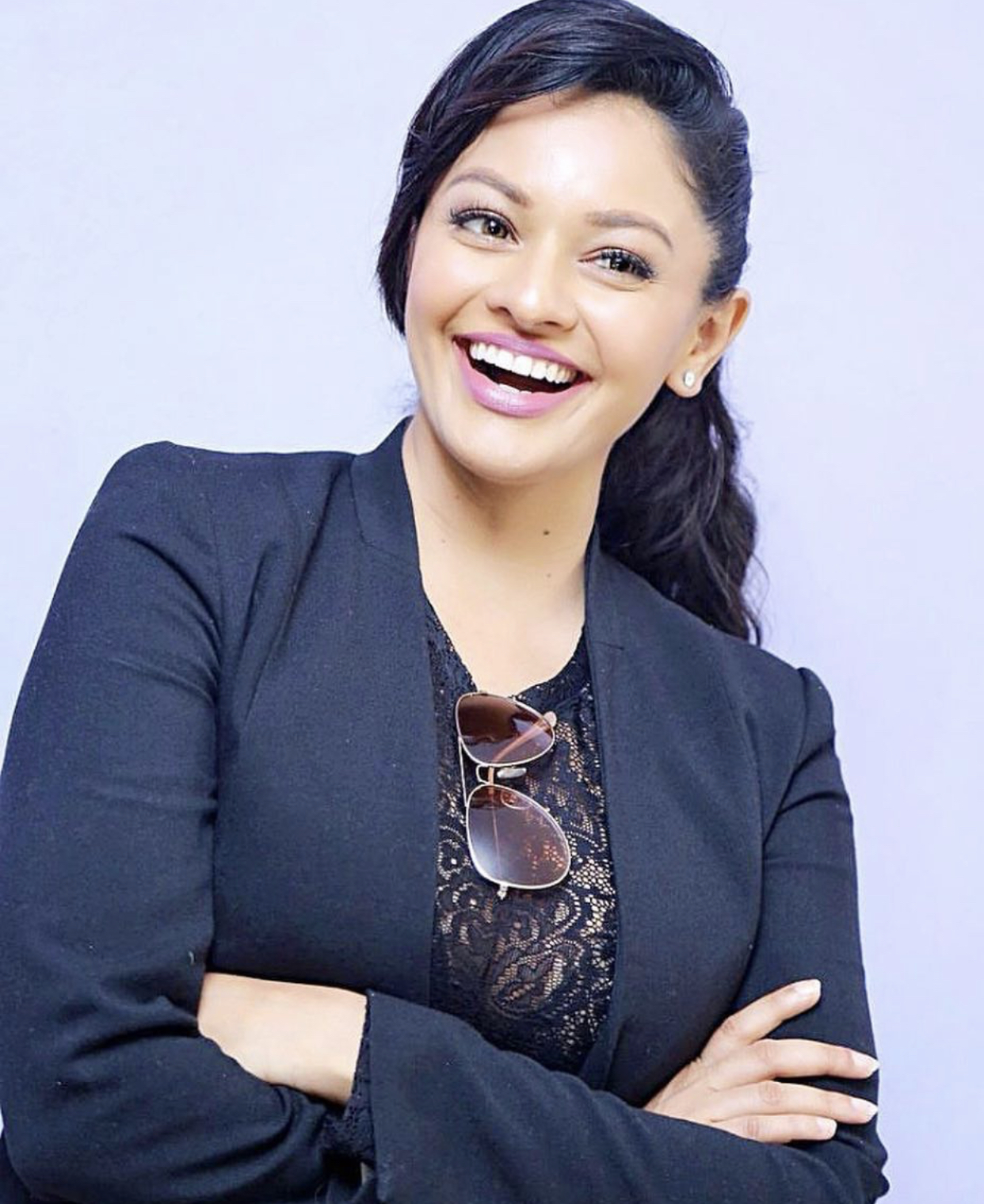
Then also people want to be around people who are going to create a positive environment. Also, people don’t want to be around nagging people who are going to be complaining all the time. Who wants to be around that? No one wants to be around that. So, why not take the perspective of positivity and embrace all the negative things and turn them into positive?
These things are sort of critical in every audition that you go to or any interview that you meet with a director or producer, it’s critical. That’s the biggest thing I would say, is just have a good attitude and don’t let it get to you. Be confident enough in your choices.
That’s wonderful. That’s the kind of advice that we need to hear from somebody that’s been in the industry for the last two decades, has worked around the world, has been in front of and behind the camera. Pooja, you are such a pleasure to speak to. There’s so much wisdom and knowledge that you’ve imparted for everybody today.
Folks, please go check out Anamika right now it is streaming on ZEE5 Premium. Go check it out. See what all the people are that are saying wonderful things about it. Why are they saying these things? Go check it out, because you’ll be pleasantly surprised. I love you and I cannot wait for the next time we get the opportunity to chat again about how fabulous you are.
Please, please. Keep saying all the good things, I love it.
You know I could go on for hours, girlfriend.
Please do. Please do. We have to talk every day now.
Absolutely. Love you to bits darling. Thank you so much.
Thank you so much. And thank you for everything that you do too. For encouraging women and for giving us this platform. Really. Thank you so much from the bottom of my heart.


